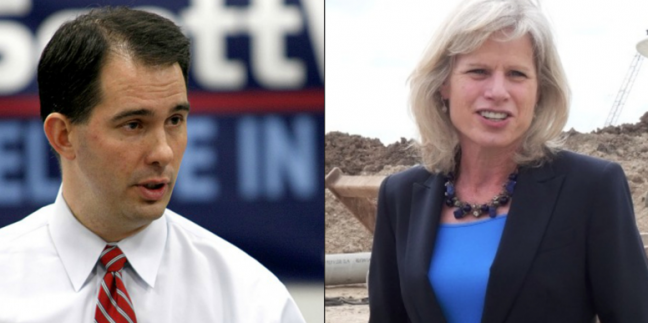Newly-released court documents implicate Gov. Scott Walker’s involvement with the conservative group, the Wisconsin Club for Growth, in raising money for campaigns during the recall elections in 2012. He is accused of encouraging donations to the group that contributed to numerous conservative campaigns during the recall. Prosecutors say Walker’s actions circumvented campaign finance limits, as the Wisconsin Club for Growth is allowed to accept unlimited anonymous contributions.
The recent documents shine light on Gogebic Taconite LLC, which has donated $700,000 to the Wisconsin Club for Growth over the past few years. The Florida-based mining company wanted to open a $1.5 billion mine in northern Wisconsin in 2010, but had to postpone plans because of difficulties with the regulatory process. In 2013, Walker and a Republican-led Legislature passed a bill that eased those difficulties. Walker denied any involvement soliciting money from the mining company, or any other actions of foul play, going as far to say he was unaware of the $700,000 in donations. He also pointed out that the investigation was stopped by a federal district court. Though it certainly seems like Walker had to be involved to a degree, an email from his campaign consultant to an adviser of his advocacy group read, “he [Walker] wants all the issue advocacy efforts run thru one group to ensure correct messaging.”
The Wisconsin Club for Growth argued the investigation, which began in August 2012, was a violation of its free speech rights. A federal district court judge consequently halted the probe this past May. The prosecution has appealed the decision, and the two sides are to make their arguments before a federal appeals court this month.
The gubernatorial race in Wisconsin is close. Former Trek Bicycles executive Mary Burke secured the nomination for her Democratic Party in August. According to the latest Marquette University Law School poll, Burke holds a slight edge over Walker among likely voters. The Democratic candidate released a statement regarding the allegations on Walker and his involvement with the Wisconsin Club for Growth, saying “If it isn’t illegal, it should be. That is not the Wisconsin way.” Burke said she would ban out-of-state donations entirely, to limit outside interests. Walker called this hypocritical; in the first half of 2014, 34 percent of Burke’s campaign funds have come from out-of-state donors (this compared to 54 percent for Walker). The Burke campaign said they would abide by the current laws, the same that their opponents follow. The two candidates have agreed to participate in two debates next month, and while the main issue of the election so far has been job growth, it will be interesting to see if Burke attacks Walker’s controversial past term.
Results of this election could have implications at the national level. Walker’s track record of strong, uncompromising conservative politics appeals to both Tea Partiers and mainstream Republicans. It certainly will be tough for Walker to appeal to a diversified, national audience with such a controversial record after just one term in office. He should remember that while he is often applauded by conservatives for revoking collective bargaining rights from state employees, he showed no intentions of bipartisanship despite the thousands of protestors outside the Capitol. He has benefited from a Republican majority in both the state senate and assembly in his first term. From the Republican Party’s perspective, Walker could be a dangerous candidate. Even if he is innocent of all the allegations brought against him, his record indicates a high level of carelessness for being associated with such scandals — something that will be hard to defend in a general election.
This is not Walker’s first run-in with campaign controversy. This past February, more than 27,000 emails, written by Walker’s aides, were released implicating his campaign staff was coordinating with county workers while he was running for governor in 2010. The emails indicate Walker encouraged communication between county staff and campaign workers regarding the presentation of campaign news releases. The related investigation resulted in six convictions for charges varying from embezzlement, money laundering and other violations of campaign finance. Walker was not charged. When the issue was brought up on Fox News last Sunday, Walker quickly dismissed it as “old news.” Though, it certainly seems suspicious that Walker had no knowledge of the illegal activities, when some of the emails specifically outline his directives.
Walker has weathered heavier storms than this John Doe investigation since taking office. He prevailed over protestors of his budget bill and won the resulting recall election by a healthy margin. Accused of cronyism in April 2011, Walker felt pressured to reverse the hire of a 27-year-old son of a lobbyist from a leadership position in the Commerce Department. Through all of this, he has been able to maintain solid backing, particularly in the northern half of Wisconsin. While Walker faces a strong opposition, clearly he has his supporters, too — whoever they may be.
Omer Arain ([email protected]) is a sophomore majoring in political science and economics.














